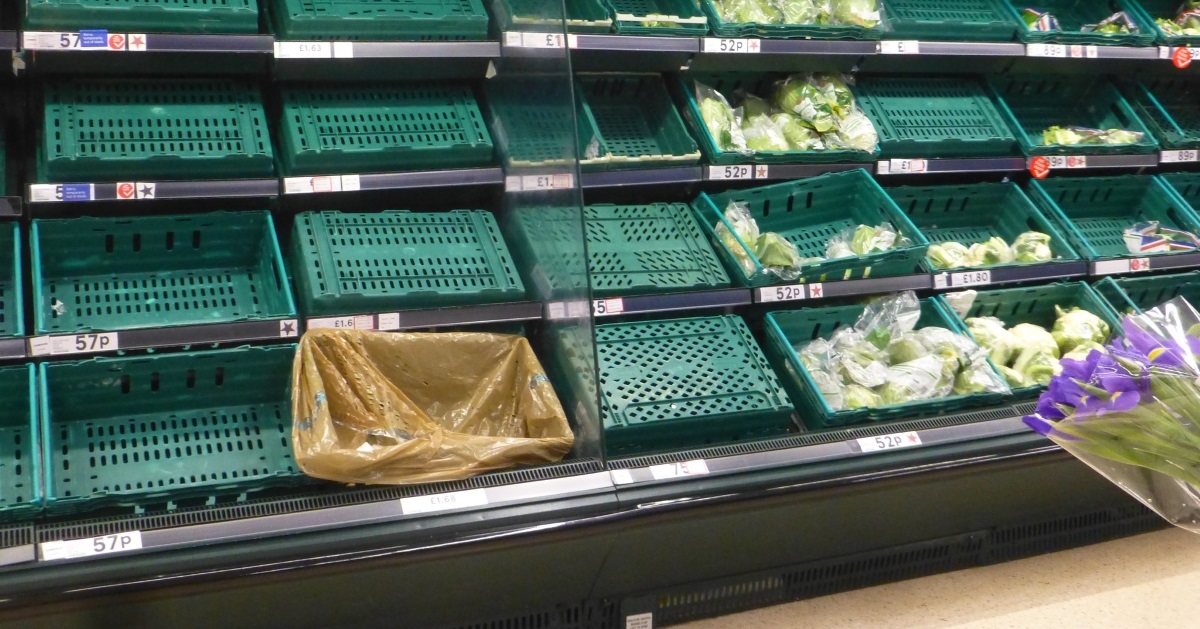Supermarkets need to examine supply chain to avoid fresh produce shortages
21/02/2023

Strawberries at Christmas? Mangoes in March? We’ve all got used to having any product, at any time of the year available in our supermarkets, ready to satisfy any food trend or surge in consumer demand.
But in the past few weeks photos have been emerging of empty shelves as food shortages have hit the fresh produce sector.
I'm sorry, @tesco this is not good enough in your Dalmarnock store on a Friday afternoon 😔 Lots more shelves with empty boxes throughout the store. Rising prices are bad enough but lack of basic foodstuffs is unacceptable. pic.twitter.com/udetX5ufUw
— Cllr Andrea Cowan (@AndreaCowanSNP) February 18, 2023
It’s not what you’d expect of a well-oiled global supply chain system that’s been operating for decades – so what’s going wrong?
With rising energy costs, climate change, labour cost increases and Brexit – there’s no shortage of challenges for today’s grocers. Add weather problems into the mix and you have the scenario we’ve seen recently with shelves empty of tomatoes.
“Consumers forget that agricultural production is always subject to weather conditions and seasonality is one of the ‘toughest nuts to crack’ in fresh produce supply chains,” says Aris Matopoulous, Professor of Supply Chain Design.
“Tomato and tomato products are the most consumed vegetables worldwide. In the UK we import tomatoes mainly from the Netherlands, Spain and Morocco. However, the high costs of electricity have affected Dutch greenhouse producers and benefited tomato-producer countries such as Morocco.”
Abhi Ghadge, Associate Professor of Supply Chain Management, says that shoppers might continue to see problems: “Fresh salad including cucumbers, cabbages and cauliflowers will all be hit by shortages in the coming weeks. But we can’t just blame Brexit. A range of issues are having an impact on supply chains. With the rising cost of heating greenhouses, and labour costs increasing, British and European farmers have scaled back on producing certain goods.”
With a seemingly perfect storm disrupting our shopping baskets, what can be done to address the problems?
Professor Matopoulos says that supermarkets need to start looking further into the future: “In the short-term, supermarkets have not got a lot of aces to pull out from their sleeves, but the in the medium to long- term they can try and balance better their supply base, reducing over reliance on specific suppliers and countries.”
Being agile and flexible in the supply chain is something Professor Ghadge also believes will help: “What supermarkets must do is think about innovative solutions. Local sourcing, and alternate suppliers are some commonly used supply chain strategies which can help manage such issues. The UK government also needs to play a part, building resilience around these recurring supply chain issues with food shortages.”
Find out more about Cranfield’s expertise and programmes in logistics, procurement and supply chain management.
Featured image by citytransportinfo on Flikr
Categories & Tags:
Leave a comment on this post:
You might also like…
From classroom to cockpit: What’s next after Cranfield
The Air Transport Management MSc isn’t just about learning theory — it’s about preparing for a career in the aviation industry. Adit shares his dream job, insights from classmates, and advice for prospective students. ...
Setting up a shared group folder in a reference manager
Many of our students are now busy working on their group projects. One easy way to share references amongst a group is to set up group folders in a reference manager like Mendeley or Zotero. ...
Company codes – CUSIP, SEDOL, ISIN…. What do they mean and how can you use them in our Library resources?
As you use our many finance resources, you will probably notice unique company identifiers which may be codes or symbols. It is worth spending some time getting to know what these are and which resources ...
Supporting careers in defence through specialist education
As a materials engineer by background, I have always been drawn to fields where technical expertise directly shapes real‑world outcomes. Few sectors exemplify this better than defence. Engineering careers in defence sit at the ...
What being a woman in STEM means to me
STEM is both a way of thinking and a practical toolkit. It sharpens reasoning and equips us to turn ideas into solutions with measurable impact. For me, STEM has never been only about acquiring ...
A woman’s experience in environmental science within defence
When I stepped into the gates of the Defence Academy it was the 30th September 2019. I did not know at the time that this would be the beginning of a long journey as ...






